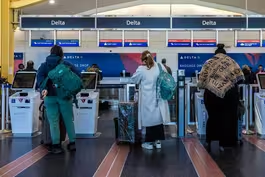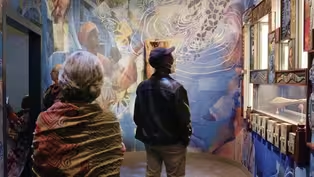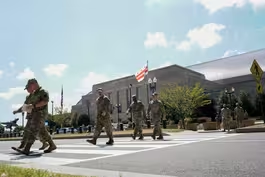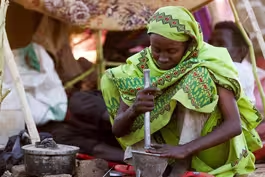
CDC shooting highlights hostility against health workers
Clip: 8/12/2025 | 8m 2sVideo has Closed Captions
CDC shooting highlights increasing rhetoric and hostility against health professionals
The shooting at the CDC headquarters in Atlanta has shaken many in the field of public health. Authorities say the 32-year-old gunman fired nearly 200 rounds at six buildings on the CDC campus and believed COVID-19 vaccines were to blame for his mental health problems. Geoff Bennett discussed rhetoric and hostility against health professionals with Dr. Megan Ranney.
Problems playing video? | Closed Captioning Feedback
Problems playing video? | Closed Captioning Feedback
Major corporate funding for the PBS News Hour is provided by BDO, BNSF, Consumer Cellular, American Cruise Lines, and Raymond James. Funding for the PBS NewsHour Weekend is provided by...

CDC shooting highlights hostility against health workers
Clip: 8/12/2025 | 8m 2sVideo has Closed Captions
The shooting at the CDC headquarters in Atlanta has shaken many in the field of public health. Authorities say the 32-year-old gunman fired nearly 200 rounds at six buildings on the CDC campus and believed COVID-19 vaccines were to blame for his mental health problems. Geoff Bennett discussed rhetoric and hostility against health professionals with Dr. Megan Ranney.
Problems playing video? | Closed Captioning Feedback
How to Watch PBS News Hour
PBS News Hour is available to stream on pbs.org and the free PBS App, available on iPhone, Apple TV, Android TV, Android smartphones, Amazon Fire TV, Amazon Fire Tablet, Roku, Samsung Smart TV, and Vizio.
Providing Support for PBS.org
Learn Moreabout PBS online sponsorshipGEOFF BENNETT: We are learning more about last week's shooting at the CDC headquarters in Atlanta, which has shaken many in the field of public health.
Authorities say the 32-year-old gunman fired nearly 200 rounds at six buildings on the CDC campus.
One police officer was killed, and the suspect was later found dead from a self-inflicted gunshot wound.
Authorities also say the gunman believed the COVID-19 vaccine was to blame for his mental health problems, including depression and thoughts of suicide.
In the days since, CDC staff have spoken out about what they describe as dangerous rhetoric and rising hostility.
Joining us now to discuss this is Dr. Megan Ranney, dean of the Yale School of Public Health and professor of emergency medicine.
Thank you for joining us.
DR. MEGAN RANNEY, Yale University: My pleasure.
Thanks so much for having me on tonight.
GEOFF BENNETT: We have seen reporting that many CDC staff are dreading returning to work, many still deeply shaken after last week's shooting.
From what you're hearing, what's the general mood among health care and public health workers right now?
DR. MEGAN RANNEY: Well, I have spent the weekend talking to friends and colleagues within the CDC, within state and local public health departments, as well as within health care across the country.
And I will say the mood is one of both fear and frustration or maybe even anger, fear because folks were shot at.
And it is by the grace of God that only one person died on Friday evening.
Frustration and anger because it's felt by many that this was almost inevitable, that at some point the violent rhetoric that is experienced online or sometimes that some of us have experienced in person being yelled at us was eventually going to turn into actual physical threats.
GEOFF BENNETT: On that point, at a press conference this morning, the Georgia Bureau of Investigations at a search of the shooter's home turned up documents expressing what they described as discontent with the COVID-19 vaccinations.
Tell me more about how this rhetoric, the misinformation about vaccines have played a role in this tragedy and have complicated the work that you and your colleagues do.
DR. MEGAN RANNEY: Yes, so it's a little bit early to know all the details about the shooter and the shooting.
But what is absolutely true is that there -- instead of there being discussion or debate about science, a reasoned evaluation of the relative risks and benefits of interventions, instead, what's happening is that an entire group of people, scientists, public health workers, health care professionals, are being dehumanized and even demonized and blamed for things that are often not their fault and may not even be the fault of, say, for example, the vaccine.
We have seen a rise in that violent rhetoric online over the past few years, but that coupling of I am in pain and suffering to I must take that out on individuals who are working in health-related fields, that is relatively new and quite scary and I think reflected in the shooting.
GEOFF BENNETT: Secretary Kennedy, known for his anti-vaccine views, he visited the CDC yesterday, issued a statement condemning the shootings.
The new CDC director did essentially the same thing.
Do gestures like that meaningfully change the tone and climate?
DR. MEGAN RANNEY: I think it's too early to say.
I think that gestures matter, right, after a mass shooting.
Having those gestures after things like -- if I go back to something like 9/11, right, which was a terrorist attack, and, in many ways, this was a terrorist attack, those gestures, those symbolic acts do make a difference, understanding that just because only one person died it does not mean that this was not a severe attack with severe consequences both in the short and long term for the psychological well-being of people that work in this field, as well as potentially for their physical health.
Again, those gestures matter.
But gestures alone are not enough.
We also need to think about, how do we actually ensure the physical safety of people working in public health and health care?
How do we have an emergency response system that is better?
I have heard stories from people who were at work on Friday night who only knew that there was an ongoing shooting because friends or colleagues texted them.
They otherwise would have walked out into the line of fire.
So, thinking about that physical safety, thinking about psychological safety, how do we support people, the survivors of this shooting, who again may not have sustained physical wounds, but have certainly sustained psychological wounds.
And, of course, if we are worried that someone is in crisis and has been radicalized and is in danger of hurting themselves or others, how do we take steps to make sure that person does not hurt themselves or others, does not have access to a firearm in that moment of crisis?
GEOFF BENNETT: Here's what Secretary Kennedy had to say last night on Scripps News when he was asked about disinformation and preventing something like this from happening again.
ROBERT F. KENNEDY JR., U.S. Health and Human Services Secretary: We don't know enough about what the motive was of this individual, but people can ask questions without being penalized.
And there was attacks on the NFL the other day for -- by a shooter who was concerned that he got a brain injury from playing football.
And nobody blamed The New York Times for spreading that disinformation that football can cause injuries.
GEOFF BENNETT: How do you see the comparison he's making there?
DR. MEGAN RANNEY: There are two parts.
The first is, of course, we want people to be able to ask questions and get trustworthy answers.
There are times where we don't know the answer yet.
We're still researching or exploring, and we should be honest when that is so.
But sometimes we do know the answers, and then we need to share that closest approximation of the truth that we have.
So I don't think anyone's saying that we shouldn't be asking questions.
What we are saying is that the asking questions should not be accompanied by violent rhetoric that implies that public health professionals, scientists, or health care providers are somehow out to cause harm or deserve to be hurt or killed.
The other side of that, of course, is to acknowledge that football does cause injury, including CTE, or chronic traumatic encephalopathy.
We know that.
That's why we have changed helmets and padding and all kinds of things.
Was it football that caused that man's mental illness that led him to then go to New York City and shoot up an office building?
That link is unclear.
And so I think, in this case, can vaccines or certain vaccines sometimes cause side effects?
Of course.
Is the risk greater than the benefit?
No.
For the vast majority of vaccines, certainly all that are FDA approved, we know that they are the safest and most effective way to prevent illness.
And, finally, even if this person did experience a side effect from the COVID vaccine, which does sometimes rarely happen, was that the cause of his mental illness?
We don't know, anymore than we know whether or not it was CTE that caused the man to shoot in New York.
But what we do know is that the answer to being sick physically or mentally should never be violence against another human.
GEOFF BENNETT: Dr. Megan Ranney, dean of the Yale School of Public Health and professor of emergency medicine, thank you for joining us.
DR. MEGAN RANNEY: Thank you.
GEOFF BENNETT: And we should mention the CDC started promoting a fund-raiser to help the family of the officer who was killed in the line of duty, DeKalb County Officer David Rose.
He was married with two children, and his wife is expecting their third child.
Secretary Kennedy visited the police department on Monday and met with his widow.
How to beat AI-driven custom pricing
Video has Closed Captions
Clip: 8/12/2025 | 4m 39s | How to beat AI-driven custom pricing (4m 39s)
Maine residency gives Black and Brown artists a platform
Video has Closed Captions
Clip: 8/12/2025 | 7m 52s | Maine arts residency gives Black and Brown artists a platform to develop their craft (7m 52s)
State Department drops criticism of Israel and El Salvador
Video has Closed Captions
Clip: 8/12/2025 | 6m 22s | State Department drops criticism of Israel and El Salvador in human rights report (6m 22s)
Sudan's famine worsens as civil war intensifies
Video has Closed Captions
Clip: 8/12/2025 | 5m 33s | Sudan's famine worsens as civil war intensifies: 'We have nothing to eat but animal feed' (5m 33s)
Tariff-driven inflation accelerating, AEI's Strain says
Video has Closed Captions
Clip: 8/12/2025 | 6m 7s | Tariff-driven inflation accelerating with 'worst yet to come,' AEI's Michael Strain says (6m 7s)
Providing Support for PBS.org
Learn Moreabout PBS online sponsorshipSupport for PBS provided by:
Major corporate funding for the PBS News Hour is provided by BDO, BNSF, Consumer Cellular, American Cruise Lines, and Raymond James. Funding for the PBS NewsHour Weekend is provided by...

















